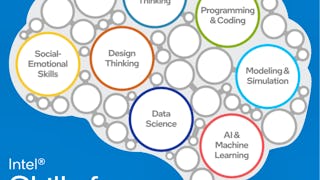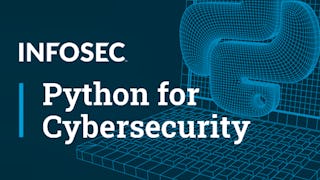- Browse
- Introduction To Programming
Results for "introduction to programming"
 Status: NewNewStatus: Free TrialFree TrialU
Status: NewNewStatus: Free TrialFree TrialUUniversity of Colorado System
Skills you'll gain: Scrum (Software Development), Agile Methodology, Systems Engineering, Risk Management, Lean Methodologies, Software Development Methodologies, Scalability, Sprint Retrospectives, Agile Project Management, Systems Development Life Cycle, Team Management, Waterfall Methodology, Sprint Planning, Backlogs
Intermediate · Course · 1 - 4 Weeks
 C
CCoursera
Skills you'll gain: Capital Budgeting, Business Valuation, Financial Analysis, Financial Modeling, Return On Investment, Financial Market, Finance, Investment Banking, Corporate Finance, Risk Management
4.4·Rating, 4.4 out of 5 stars27 reviewsIntermediate · Guided Project · Less Than 2 Hours

Skills you'll gain: AWS Identity and Access Management (IAM), Amazon Web Services, Penetration Testing, Identity and Access Management, Vulnerability Assessments, Cloud Security, Amazon Elastic Compute Cloud, Cloud API, Exploitation techniques, Cyber Security Policies, Amazon S3, Scenario Testing, Command-Line Interface, Cloud Storage
Intermediate · Course · 1 - 4 Weeks
 Status: Free TrialFree Trial
Status: Free TrialFree TrialSkills you'll gain: Rust (Programming Language), Data Structures, Package and Software Management, Blockchain, Development Environment, Web Development, Programming Principles, Web Servers, Restful API, System Programming, Maintainability, Algorithms, Integrated Development Environments, Software Testing, Unit Testing, Software Design Patterns, Development Testing, Debugging
3.8·Rating, 3.8 out of 5 stars23 reviewsBeginner · Specialization · 3 - 6 Months
 Status: Free TrialFree Trial
Status: Free TrialFree TrialSkills you'll gain: Telecommuting, Student Engagement, Education Software and Technology, Digital pedagogy, Virtual Environment, Stress Management, Instructional Design, Organizational Skills, Active Listening, Empathy, Communication, Collaboration, Driving engagement, Relationship Building, Emotional Intelligence
Beginner · Course · 1 - 4 Weeks
 Status: Free TrialFree Trial
Status: Free TrialFree TrialSkills you'll gain: MITRE ATT&CK Framework, Cybersecurity, Cyber Threat Intelligence, Cyber Operations, IT Automation, Scripting, Python Programming
4.5·Rating, 4.5 out of 5 stars427 reviewsIntermediate · Course · 1 - 4 Weeks
 Status: PreviewPreviewU
Status: PreviewPreviewUUniversity of Glasgow
Skills you'll gain: digital literacy, Ethical Standards And Conduct
Intermediate · Course · 1 - 4 Weeks
 Status: Free TrialFree TrialU
Status: Free TrialFree TrialUUniversity of Pennsylvania
Skills you'll gain: Spreadsheet Software, Financial Modeling, Regression Analysis, Excel Formulas, Business Modeling, Simulation and Simulation Software, Operations Research, Microsoft Excel, Google Sheets, Probability Distribution, Analysis, Forecasting, Predictive Analytics, Risk Analysis, Statistical Methods, Data Analysis Software, Process Optimization, Decision Tree Learning
4.2·Rating, 4.2 out of 5 stars3.9K reviewsMixed · Course · 1 - 4 Weeks
 Status: NewNewStatus: Free TrialFree TrialM
Status: NewNewStatus: Free TrialFree TrialMMicrosoft
Skills you'll gain: ASP.NET, .NET Framework, Responsive Web Design, HTML and CSS, C# (Programming Language), Web Applications, Web Development, Javascript and jQuery, UI Components, Application Frameworks, Bootstrap (Front-End Framework), Development Environment, Restful API, Microsoft Development Tools, React Redux, Model View Controller, Middleware
Intermediate · Course · 1 - 3 Months
 Status: Free TrialFree TrialU
Status: Free TrialFree TrialUUniversity of Alberta
Skills you'll gain: Agile Software Development, Agile Methodology, Requirements Analysis, Software Development, Requirements Management, Product Management, Software Engineering, Project Planning, Process Development, Project Management
4.6·Rating, 4.6 out of 5 stars7.8K reviewsMixed · Course · 1 - 4 Weeks
 Status: Free TrialFree Trial
Status: Free TrialFree TrialSkills you'll gain: Malware Protection, Identity and Access Management, Incident Response, Cybersecurity, Network Security, Threat Detection, Cyber Attacks, Authentications, Security Awareness, Digital Forensics, Security Controls, Infrastructure Security, Multi-Factor Authentication, Human Factors (Security)
4.6·Rating, 4.6 out of 5 stars16K reviewsBeginner · Course · 1 - 3 Months
 Status: Free TrialFree Trial
Status: Free TrialFree TrialSkills you'll gain: Bootstrap (Front-End Framework), HTML and CSS, User Interface (UI), Front-End Web Development, Responsive Web Design, JavaScript Frameworks, Web Design, Web Development, Web Applications, Hypertext Markup Language (HTML), Full-Stack Web Development, Cascading Style Sheets (CSS), Back-End Web Development, React.js
4.7·Rating, 4.7 out of 5 stars3.7K reviewsBeginner · Course · 1 - 4 Weeks
Searches related to introduction to programming
In summary, here are 10 of our most popular introduction to programming courses
- Introduction to Agile Methods: University of Colorado System
- Введение в оценку компаний с WACC: Coursera
- Introduction to AWS Pentesting: Packt
- Rust Programming Masterclass from Beginner to Expert: Packt
- Introduction to Learning Remotely: Intel
- Introduction to Python for Cybersecurity : Infosec
- Introduction to Digital Epistemology: University of Glasgow
- Introduction to Spreadsheets and Models: University of Pennsylvania
- Introduction to ASP.NET Core Framework: Microsoft
- Introduction to Software Product Management: University of Alberta










